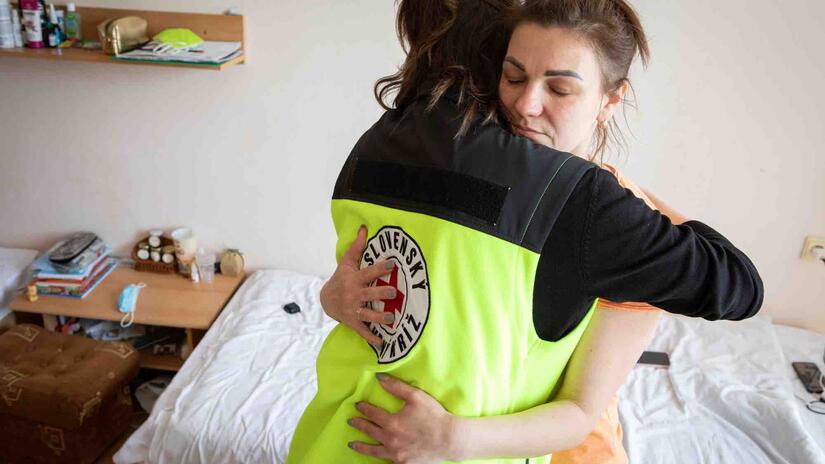Since the outbreak of the conflict in Ukraine, millions of people have been displaced from their homes, facing distressing situations that have left them with trauma and loss. The impact of this crisis on mental health cannot be underestimated, with one in five individuals affected by mental health disorders in post-conflict settings, as reported by the World Health Organization (WHO).
The conflict in Ukraine has been devastating, forcing 6,199,700 people to flee their homes as refugees around the world, with an additional 5,088,000 internally displaced within Ukraine itself.
These individuals have endured heartbreaking losses, including the deaths of loved ones, the destruction of their homes, and the loss of their livelihoods. Witnessing traumatic events has further compounded the mental anguish faced by many.
Since the beginning of the conflict, Red Cross and Red Crescent staff and volunteers have been on the ground, assisting people at border crossing points, train stations, and temporary shelters. They have been providing a listening ear, demonstrating empathy, sharing life-saving information, and taking care of vulnerable individuals. In neighboring countries, IFRC member National Societies are witnessing an increasing number of pleas for mental health assistance through their community feedback systems.
To address this massive need for mental health and psychosocial support, IFRC, the IFRC Psychosocial Centre, and National Red Cross Societies in Ukraine and 24 European countries have united their efforts. Since 2022 June, the EU4Health program provides in-person Psychological First Aid (PFA) within Mental Health and Psychosocial Support (MHPSS) services, via helplines and other service platforms, and by building and strengthening the capacities of Red Cross Red Crescent National Society staff and volunteers, frontline responders and other professionals.
“Through this project, we are continuously creating the awareness to all that it is okay to take a break and prioritize your emotional, psychological, and social well-being especially in stressful situations,” says Basilio Muiruri acting Project Coordinator of Health and Care at IFRC Europe.
“As a team together with the national societies’ staff and volunteers, we are emphasizing to the people fleeing Ukraine and those affected inside Ukraine, that indeed they are worthy of happiness and peace of mind, through provision of psychological first aid and basic coping skills.”
As part of the European Commission’s Directorate-General for Health and Food Safety (DG SANTE), the EU4Health programme takes a comprehensive approach to mental health and psychosocial support. Funded by the European Union, EU4Health is committed to restoring hope and healing to the people of Ukraine during their time of greatest need.
In this collaborative project, National Red Cross Societies in Ukraine and 24 European countries have achieved significant milestones in their mission in the last year to provide psychosocial support to individuals displaced from Ukraine. Some key accomplishments include:
- Establishment of 27 helplines providing Psychological First Aid and Psychosocial Support services to 68,706 people displaced from Ukraine.
- Training of 4,114 staff and volunteers in Psychological First Aid and Psychosocial Support, including 440 who are Ukrainian or Russian speakers.
- Engagement of 1,853 staff, volunteers, and first responders in the response to the Ukraine crisis.
- Facilitation of 490 meetings between National Societies, key stakeholders, and partners to ensure a coordinated response.
Mental health is a neglected area of public health in the WHO European Region, with over 150 million people suffering from mental health conditions by 2021. Only 1 in 3 individuals with depression receive proper care, according to The Pan-European Mental Health Coalition (who.int). The conflict in Ukraine has led to an estimated 15 million people needing psychosocial support, with millions potentially requiring medical treatment.
Stigma, discrimination, and human rights abuses still hinder access to mental health services. World Mental Health Day on October 10th serves as an opportunity to raise awareness and address gaps in mental health services, with a focus on it being a universal human right in 2023.
The content of this article is the sole responsibility of IFRC and does not necessarily reflect the views of the European Union.






